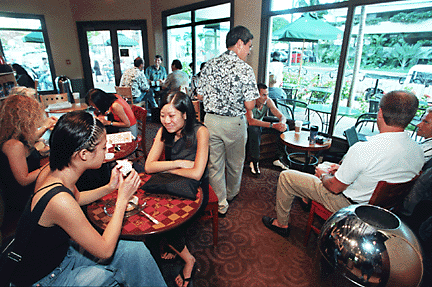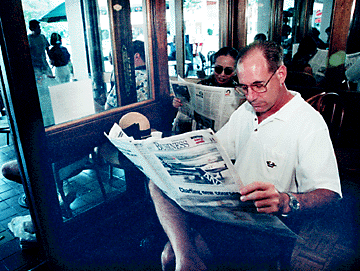


BREW-HAHA
That age-old saying
By Cynthia Oi
holds true: Location,
location, location
Star-BulletinLOCATION, location, location. For Coffee Manoa owner Kathy Maddux's friend, city planner Alex Achimore, 48, the value of Starbucks in Manoa is questionable. The neighborhood is one of Oahu's oldest and though it is just a few minutes from downtown Honolulu, it has retained much of its quiet ambience.
It's not that Manoa hasn't seen change. In the 1960s, there was just an IGA store; now there's a shopping center in its place, with a Safeway, Longs, McDonald's, banks, several eateries, a post office, bakery and other stores.
The new Starbucks will be in a one-story retail building at the busy intersection of East Manoa Road and Huapala Street. It will share a 15- to 16-space parking lot behind the building with other tenants.

Achimore thinks the location "is perfect for a coffee shop," a small one that draws customers from the neighborhood. But with 1,800 square feet of retail space, the new Starbucks is likely planned as a regional attraction, one that brings in people from outside the valley."Manoa suffers from increased traffic and bringing other people in doesn't benefit the citizens of Manoa," said Achimore, an architect who once designed shopping centers and chain stores.
"From a planner's perspective, a chain store has a national marketing strategy that has very little to do with the communities they're in," he said.
Chain stores that have moved into Hawaii in the past 10 years have had positive effects: lowering prices and forcing older companies to become more efficient, he said. "But they've also put companies out of business, like Arakawa's."
"Citizens may see lowering of prices in some form, but it may only be transitory because once everybody else is dead then what we get is a monopoly situation," he said. "And the profits are not coming back to the community."
He argues against the sameness of one Starbucks to the next.
"We need to decide what kind of community we want, and if we're happy with that sort of chain-store community, fine, but if we're uncomfortable with it, then we need to find ways to support our local businesses that are really local."
Remarks like Achimore's cut Dean McPhail deeply. Tears fill the eyes of the Hawaii Starbucks co-owner.
"When we started this company, no one seemed to acknowledge that it was just a group of local guys who at the time were unemployed, who were building a company from the ground up," he said, speaking softly and slowly.
"And, frankly, that was tough. That hurt because we poured in not only our money but the passion we have to build a company and build it with people.
"Certainly we had a big name on the door, but 95 percent of this company is owned locally and that means that if and when there's money funneling out of it, 95 percent of it stays here. Jobs and tax dollars stay here."
The hostility may come because "humans are afraid to change. Change doesn't come naturally," he said.
Kathy Maddux knows the effects of change, just looking around the marketplace. The baby store recently closed, the ice cream parlor is now a wrap-sandwich shop, the jewelry store was replaced by a bakery.
"Everybody keeps telling me 'Don't worry Kathy, you have a really loyal following,' " she said. "The loyal following is very important. That's what gives any store or business its soul and its heart."
That coffee houses can inspire such emotion may be an indication of people's yearning to make connections.
Maddux and McPhail aren't much different. Neither are their respective customers Paul Berry and Harri Buquet, or employees, Natalia Lugani and Jeff Wachter. They all want the same thing. It is perception that keeps them apart.
Said McPhail, "At the end of the day, it's not about what name is on the door, or how many stores there are, how big or how small. It's about a great cup of coffee and its about people. It's about the community environment."
McPhail and friends
By Cynthia Oi
Star-BulletinDEAN McPhail sips a cup of coffee outside Starbucks at Ward Village. This shop has proven to be a strong segment of Coffee Partners Hawaii's holdings, bustling with tourists, office workers and people just hanging out.
McPhail, 38, came to Hawaii 10 years ago from Florida, where he worked in the restaurant business, to head Pacific Video Entertainment Group, which owned the Blockbuster Video franchise in Hawaii and Guam. When the franchise was sold, McPhail wasn't sure what he wanted to do.
Then he recalled that while running Blockbuster, he and Greg Meier and his brother, Scott McPhail, two other Coffee Partners, would go out almost every day for coffee.
"Even if it was a meeting, it was still a break from that daily grind," he said, no pun intended.
That led to the forming of Coffee Partners and its relationship with the Seattle-based Starbucks Corp. as its only licensee.
The partners have what some see as a magical money-making coffee machine.
What many don't know, McPhail said, is that Coffee Partners is still in the start-up stage, that the money isn't pouring in.
"But we love the whole environment," referring to the company's philosophy: to provide people with a "third place" to enjoy coffee, other than at home or office.
"We give people a place to go where they can be with their friends or business associates," he said.
"Ward Village was the store that everyone was surprised about," said the Michigan-born McPhail. "It has become a real community deal. You go down there every day and it's the same folks. They've all gotten to know each other."
He doesn't think setting up a Starbucks near Maddux's shop will hurt her business and isn't going to Manoa to do that.
"The coffee business is a very repetitive type of business and I think she has an established customer base that will stay with her regardless of whether we're there or not."
Besides, he said, coffee accessories, such as thermal cups and mugs, are a big part of Starbucks.
"If Kathy really took a look, she'd see what a different type of business we are," he said.
"We're bringing people out and into the neighborhood, which is not only good for us but good for everyone around us."
At Ward Village, Starbucks has proven to be a good neighbor for Powder Edge, a store that sells outdoor gear.
"We tap into their customer clientele because we share the age group and demographics. There's synergy," said general manager John Nakajima.
Harri Buquet lives in Manoa and has patronized Coffee Manoa, but almost every afternoon he can be found in the brown upholstered easy chair in a corner next to a window at Starbucks Ward Village.
The former hotel pool manager sips coffee while writing his autobiography on a laptop. He likes the "dynamics and the people" there.
Originally from Finland, Buquet is pleased that the coffee culture so prevalent in Europe has finally crossed over to Hawaii.
"It's a wonderful, affordable way to spend the day," he said.
"I sometimes think maybe I should hang out elsewhere, but the employees say, 'No, Harri, it wouldn't be the same without you,' " he said.
Michael Hess lives in Kailua but stops at Ward Village several times a week, often to share a table with Buquet and other coffee companions.
When he was badly injured recently in a motorcycle accident, "The only people who sent me flowers were the people who work here," he said. "What does that say to you? It says to me that they care."
Maui-born Jeff Wachter, 31, has worked at Starbucks for a year. He enjoys coming to work everyday ("Can't say that about a lot of jobs"); likes the parade of different customers ("Some real characters"); and likes the company ("Probably the most organized place I've worked for").
"It's a hangout, an alternative to a bar. Its clean, well-lit and doesn't have the reputation thing like a bar," Wachter said.
At Starbucks, Buquet added, "It's not so much the cup of coffee or the music, but the feeling you get when you walk in the door and know the people and know that you are welcome and people care about you. What we have here is a community."